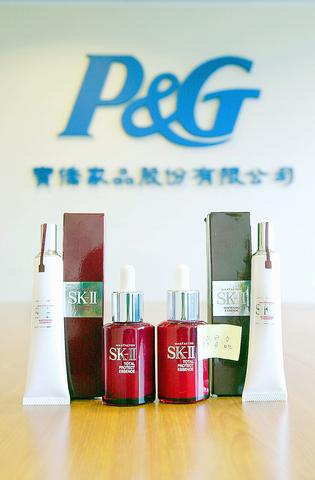The Taipei Bureau of Investigation (調查局台北調查處) busted an underground Taipei County factory recently for allegedly manufacturing counterfeit cosmetic goods. Investigation officials apprehended an "undisclosed number of people" at the Sanchung City facility and confiscated a large quantity of fake product and product packaging.
The counterfeit product -- Procter & Gamble's (P&G,

PHOTO: CHIANG YING-YING, TAIPEI TIMES
The two-year investigation came to light Oct. 30 as Bureau agents swooped down on the Sanchung factory and seized 300 tubes of fake SKII -- valued at NT$690,000 -- and over 10,000 fake trademark labels.
Seeking to address consumer safety concerns over the fake products, P&G public affairs manager Jane Su (
The official said the fraudulent products usually turn up in small private cosmetic shops, beauty supply stores and import product speciality shops. Fakes are a dead-giveaway as they usually retail for more than 20 percent less than the real thing. A 30gm tube of SKII Whitening Essence retails for approximately NT$2,300.
P&G estimated losses from the Sanchung incident alone will cost them more than NT$10 million.
P&G officials say consumers familiar with SKII can distinguish real and bogus products by fragrance and packaging color variations -- fake SKII packaging is darker burgundy and lacks the glossy silver label. Su said consumers can be assured they have bought real SKII products if they make their purchases from department stores or Max Factor specialty stores.
Meanwhile, investigation officials remained mum on details surrounding the Sanchung bust, saying they "didn't want to jeopardize the investigation by making their findings public."
The official said the problem is not limited to Sanchung as Bureau investigators have also nabbed several individuals in a Chungho City factory for printing fake SKII packaging. Punishment for counterfeiters in Taiwan -- according to another Bureau of Investigation official, Lee Yi-hsiung (
The fine for intent to defraud by means of producing false product labeling is a violation of Article 62 of the Trademark Law, and punishable by imprisonment of no more than three years, or a fine of no more than NT$200,000, according to Winifred Tung (童文薰), an attorney at Qi Lin International Law Office (齊麟國際法律事務所). Most copyright infringements usually result in monetary fines only.
P&G's Su said the company believes the perpetrators should be penalized to the full extent of the law and indicated they will seek compensation of up to NT$100 million.
Tung advised P&G to strictly self-monitor sales outlets and help to ease the burden on consumers by finding new ways to distinguish their products from bogus ones.
However P&G emphasized that while they have used various design alterations as a deterrent, "Taiwan is the counterfeiting kingdom," and little can be done to stay ahead of counterfeiters.

The Eurovision Song Contest has seen a surge in punter interest at the bookmakers, becoming a major betting event, experts said ahead of last night’s giant glamfest in Basel. “Eurovision has quietly become one of the biggest betting events of the year,” said Tomi Huttunen, senior manager of the Online Computer Finland (OCS) betting and casino platform. Betting sites have long been used to gauge which way voters might be leaning ahead of the world’s biggest televised live music event. However, bookmakers highlight a huge increase in engagement in recent years — and this year in particular. “We’ve already passed 2023’s total activity and

Nvidia Corp CEO Jensen Huang (黃仁勳) today announced that his company has selected "Beitou Shilin" in Taipei for its new Taiwan office, called Nvidia Constellation, putting an end to months of speculation. Industry sources have said that the tech giant has been eyeing the Beitou Shilin Science Park as the site of its new overseas headquarters, and speculated that the new headquarters would be built on two plots of land designated as "T17" and "T18," which span 3.89 hectares in the park. "I think it's time for us to reveal one of the largest products we've ever built," Huang said near the

China yesterday announced anti-dumping duties as high as 74.9 percent on imports of polyoxymethylene (POM) copolymers, a type of engineering plastic, from Taiwan, the US, the EU and Japan. The Chinese Ministry of Commerce’s findings conclude a probe launched in May last year, shortly after the US sharply increased tariffs on Chinese electric vehicles, computer chips and other imports. POM copolymers can partially replace metals such as copper and zinc, and have various applications, including in auto parts, electronics and medical equipment, the Chinese ministry has said. In January, it said initial investigations had determined that dumping was taking place, and implemented preliminary

Intel Corp yesterday reinforced its determination to strengthen its partnerships with Taiwan’s ecosystem partners including original-electronic-manufacturing (OEM) companies such as Hon Hai Precision Industry Co (鴻海精密) and chipmaker United Microelectronics Corp (UMC, 聯電). “Tonight marks a new beginning. We renew our new partnership with Taiwan ecosystem,” Intel new chief executive officer Tan Lip-bu (陳立武) said at a dinner with representatives from the company’s local partners, celebrating the 40th anniversary of the US chip giant’s presence in Taiwan. Tan took the reins at Intel six weeks ago aiming to reform the chipmaker and revive its past glory. This is the first time Tan